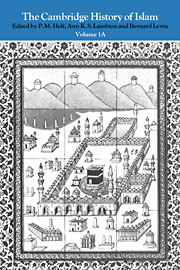1 - Pre-Islamic Arabia
from Part I - The rise and domination of the Arabs
Published online by Cambridge University Press: 28 March 2008
Summary
In the history of the ancient world, Arabia has a place not unlike that of two other peninsulas in the Mediterranean region—Italy and the Balkans. It owes this place to its being the homeland of the Semitic peoples who developed a civilization which, alongside the Hellenic and the Roman, was to be a constituent in the tripartite structure of the cultural synthesis which the Mediterranean world witnessed in the early centuries of the Christian era. But this place is rather uncertain as far as the ancient world is concerned not so much because Arabia, after all, may not have been the ‘original homeland’ of the Semites, but because Semitic civilization in its highest forms was developed not within Arabia but outside its confines, in the semi-circle known as the Fertile Crescent. Be that as it may for the Arabia of the ancient Near East, there is no doubt whatsoever that Arabia is both the homeland of the Arabs and the cradle of Islam. The term ‘pre-Islamic Arabia’ is thus a fortunate and a significant one, reflecting as it does the decisive role which Islam played in changing its character, both as a religion which appeared within its boundaries, and as a movement which launched the Arabs on the paths of world conquest. It is, therefore, from this angle that this chapter on pre-Islamic Arabia has been written, as the last in the history of the ancient Semitic Near East and the introduction to the history of the medieval Islamic world.
- Type
- Chapter
- Information
- The Cambridge History of Islam , pp. 1 - 29Publisher: Cambridge University PressPrint publication year: 1977
- 2
- Cited by

